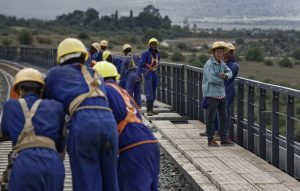On September 22, a report by the Kenyan Parliament’s transport committee made it abundantly clear that the East African country is struggling to meet its commitments on the Standard Gauge Railway (SGR), a flagship infrastructure project of Kenya-China engagement that is mutating into a critical test beyond the bilateral relations. As a result of the global economic circumstances due to the COVID-19 pandemic, the report makes the case for the government not only to renegotiate the terms of the loan provided by Chinese lenders but also to try to slash operational costs by at least 50 percent.
However, the Chinese-built railway was already struggling to make commercial sense when it was launched three years ago. Indeed, in addition to being mired in controversies, the railway had been losing a whopping $9.2 million every month, rather than generating the profits Kenya was hoping for, as it failed to meet passenger and cargo volume targets. The ongoing crisis is, therefore, a mere magnifying glass.
The ongoing troubles with the SGR are just the latest in a series of challenges facing China in the wider region of the East African Community (EAC), to which it accredited an envoy in November 2017 to establish a “cooperative relationship.” In early August 2020, Kenya’s health minister made an unusually stunning move to publicly raise concerns on the quality of Chinese-made personal protective equipment (PPE) following their failure to pass quality checks. This prompted the country to ban the importation of COVID-19 protective gear from China. Though such public denouncements and the diplomatic discomfort they create were once uncommon in broader China-Africa official relations, the trend seems to be changing of late. Government officials in many African countries seem to no longer hold back from going public to express their concerns on various issues in their relationship with Beijing. This was first illustrated by the public outcry over the racial profiling and mistreatment of African nationals in China in early April 2020.
Now there are the intensifying official calls on Beijing to provide debt relief measures to its African partners as they grapple with the health and economic consequences of the COVID-19 pandemic. In Kenya, lawmakers are speaking out in uncharacteristically frank terms. “Look,” says Kimani Ichung’wa, chairman of the Parliamentary Budget and Appropriations Committee, “our economy is beaten and we are not able to pay. We are not saying the debt is not there, but we simply want to renegotiate what we owe you and the terms of payment.”
But debt is not the only issue, nor is it all about infrastructure projects. The huge trade imbalance between China and the EAC partner states is another major stumbling block.
Though Beijing publicly states its support for EAC regional integration, China’s actual role in the bloc’s integration process is having a mixed result. Our recent analysis on China’s approach to infrastructure development in the region suggests that China’s support of infrastructure development in the EAC plays a crucial role in enabling cross-border mobility of labor, capital, and goods. This has the potential to help the EAC overcome some of its most daunting integration challenges.
Nevertheless, China’s trade relations with the bloc are proving to be a stumbling block, as all the EAC’s partner states, except for South Sudan, run a considerable trade deficit with China. This not only threatens the region’s integration prospects by jeopardizing its ability to promote intra-regional trade, industrialization, and home-grown industrial champions, but such a challenge also runs contrary to the EAC’s raison d’être, which calls for strengthening economic and trade relations among partner states to promote accelerated, harmonious, and balanced development.
The imbalanced trade relations have led to some major pushbacks from the bloc. “For Tanzania, for every dollar of goods we export to China, we usually import 10 dollars of goods from China,” Mbelwa Kairuki, the Tanzanian ambassador to China, observed recently. For its part, Kenya – the country running the largest trade deficit with Beijing in the bloc – has been even more vocal about the skewed trade balance, and is now betting on expanded exports of agriculture products to bridge the huge deficit.
This signals a brewing storm in broader China-EAC engagement that is only magnified by the ongoing global crisis, which is set to undermine the EAC’s position as the fastest growing regional economy in Africa. Indeed, acting as a magnifying glass, the outbreak has brought to light some major issues within the EAC that seem to spill over into China’s relationship with the regional bloc. These include the feeble and fragile intra-regional trade links, the poor state of infrastructure in the region, the undeclared trade wars within the bloc, the never-ending geopolitical rivalries that badly undermine any attempt at policy coordination and more.
“COVID-19 has been a double-edged sword. On one end, it has exposed the deficiencies in our structures, but it also presents opportunities. We must use COVID-19 as an impetus to improve and negotiate better outcomes with our [China],” concluded the Tanzanian head of diplomacy in China. Whether and how this could be done remains an open question. What seems certain, however, is that the collapse of Kenya’s SGR could have far-reaching consequences not just for the country but also for the prospect of both the EAC and China’s Belt and Road Initiative in the wider African region. As the coronavirus crisis adds a new layer to the complex challenges facing China’s cooperative partnership with the EAC, one wonders if it can withstand the pandemic storm.
Abdou Rahim Lema is a Ph.D. student at the University of Montreal and a former Yenching Scholar of Peking University (2018 Cohort), where he completed a master’s degree in China Studies. His research work mainly focuses on South-South Cooperation, Triangular Cooperation, and China-Africa security and development relations.
Samu Ngwenya is a Yenching Scholar at Peking University, where she is pursuing an MA in China Studies-Politics and International Relations. Her research interests focus on leveraging South-South Cooperation to promote more inclusive and sustainable development.

































